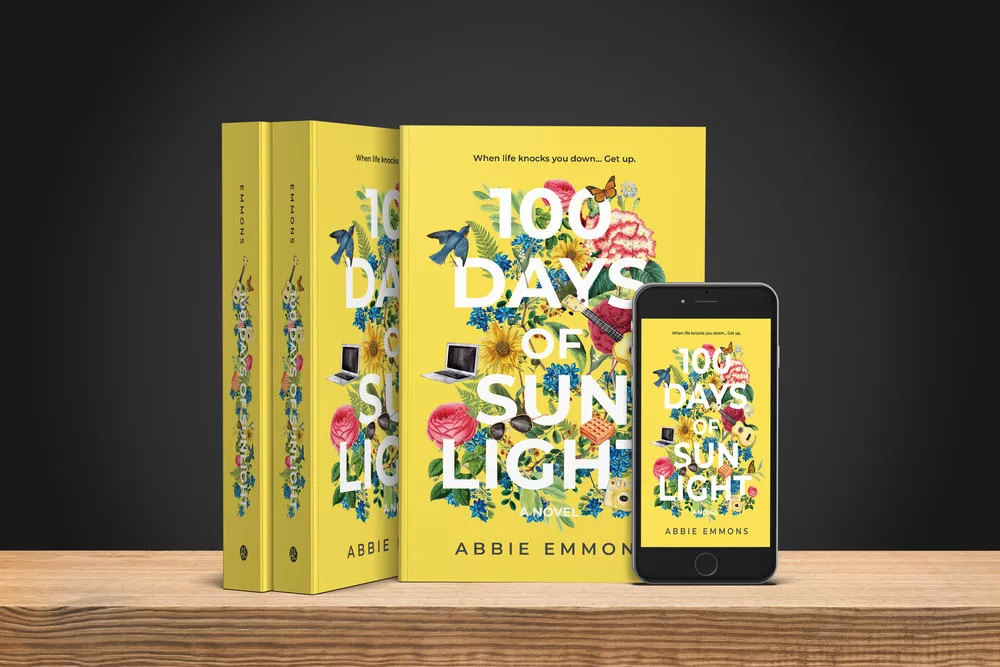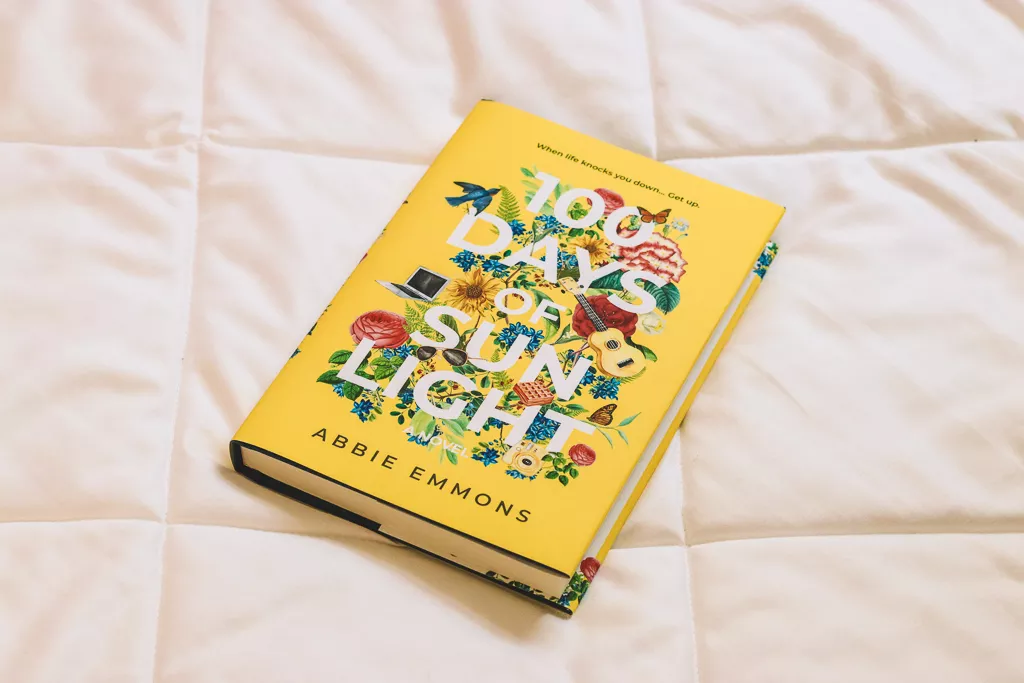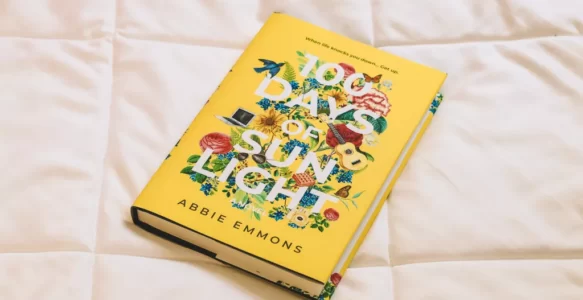Abbie Emmons’ debut is a delightful page-turner, although slightly flawed
I was looking for writing advice for my novel, the day I stumbled on Abbie Emmons’ blog. It all happened by pure chance. I needed to study how to craft a strong female character, working to avoid any unwanted or annoying clichés. To my huge surprise, Abbie answered all my questions and even more. It was while exploring her blog that I found out she was about to publish her novel: 100 Days of Sunlight.
Abbie’s voice on her blog posts is confident and energetic. This was enough. I decided it was worth trying to get into her ARC team, to get an early review copy of her story.
The Book: 100 Days of Sunlight

100 Days of Sunlight is far from what I would consider my genre and my niche—which is why I was surprised to enjoy it so much. Abbie’s story is about a teenage girl, Tessa, who becomes temporarily blind following an accident, which leads her to fall into her own abyss of darkness and self-loathing. Fortunate circumstances lead her to cross paths with Weston, a reckless and stubborn boy who has lost his legs and is forced to walk on a pair of prosthesis.
By staying close to Weston, Tessa will learn that the only obstacle to her happiness is her own self: her disability is just apparent. She is still the same person, an artist, someone who can appreciate the beauty in the world. Weston will go a long way to show her just that; and, of course, this sets the ground for a heartwarming YA romance.
What I loved about 100 Days of Sunlight
As I read Abbie’s book, my eyes ran on the lines as if skidding on a beautifully even ice path. I don’t enjoy reading YA or romance per se, and yet 100 Days of Sunlight has been a constant page-turner, perhaps thanks to the rather simple writing style which made story and characters stand out.
Given the chance, Abbie could easily write full-length essays on every single topic she knows about, be it on her YouTube channel or her blog. She is extremely knowledgeable about tropes and writing techniques, which comes across in her novel: above all else, her characters feel human. Weston is especially examined in depth, giving the reader a chance to empathise with his compelling backstory; but even Tessa and her fears take up a huge chunk of the story.
100 Days of Sunlight is a heartwarming and delightful YA romance. It is a story about growth and coping, one about learning to appreciate the smallest things.
The novel adopts multiple POVs and tenses. Tessa and Weston alternate at each chapter, and, although I feared such choice would lead to overlapping sequences, it rarely becomes unsettling. Both Weston and Tessa have their own, planned position in the story, and they both come across as well-rounded characters with their own fears, desires and needs.
Their relationship mostly builds up at the right pace. Nothing feels forced and everything evolves in a natural way. This is yet another confirmation of Abbie’s skills in creating characters and keeping them consistent throughout the plot; something not all authors (indie or not) can brag about.
100 Days of Sunlight is a pleasant journey in the psyche of two young teenagers, from conflict to resolution; a heartwarming tale about love. It is pleasant and entertaining to read, so much that I was able to complete it in less than a week—which I seldom do.
But, as much as it hurts me to say it, this is pretty much it for the ‘good stuff’ in the novel. Because Abbie’s debut is, unfortunately, far from flawless.
What I personally didn’t enjoy

There are a few things that didn’t work for me, as I was going through 100 Days of Sunlight.
First off, Abbie’s writing style is delicately simple—perhaps too much for my own taste. This can be off-putting, but it must be said that it helps the story stand out and it can please several readers out there. And Abbie is an excellent storyteller; writing character-driven stories is certainly within her comfort zone, and her debut novel proves it.
But there is ground for improvements. Some statements in her prose feel superfluous or redundant. She is sometimes a master at implications, other times reveals too much. But it is something which can be easily fixed with her next projects.
The structure, on the other hand, felt quite diluted and sometimes confusing. The multiple POVs didn’t help, but neither did the choice of setting part of the book in Weston’s past. Most of those chapters, as enthralling as they are, bring little to nothing to Weston’s story, and only the first few felt truly useful for the plot. Those moments help make him stronger, but Weston comes off as a strong character on his own, even without chapters and chapters of backstory to prove it. Which leads me to the next point.
There is perhaps too much focus on Weston. He is clearly important to Tessa, but we spend much more time learning about him than about Tessa herself. And, on the other hand, the book opens with several pages of heavy exposition which are meant to ‘set the scene’ for the events to follow. Yet, this risks pulling the reader out of the story and delays the moment in which we can finally start following Tessa’s journey.
Here’s one tiny tip for Abbie to think about: what if we saw the accident happen as part of the beginning chapters, rather than being told so? What if we followed Tessa as she found out about her blindness?
One last perplexity which is sure to disappear with Abbie’s next projects: voice. All characters had quite similar voices with imperceptible differences among each other: Rudy, Weston, Tessa and even some of Rudy’s youngest brothers had a vocabulary and a way of speaking which wasn’t unique to them at all. This makes some dialogues confusing to follow, but it also risks compromising the world of the story itself.
But none of this is a major issue, at the end of the day. Despite these little, negligible flaws, Abbie’s book is still enjoyable, fun, entertaining and as heartbreaking as it can be. It made me shudder, sigh, hope, feel. Which is all a debut novel can really ask for.
There is much of Abbie in her book, from coloured bookshelves to tasty waffles. Her spirit jumps all around the prose and breathes life into it. For this reason, I sincerely hope Lady Emmons is planning to write more novels in the near future. I will certainly be here, waiting to witness every little glimpse of improvement during the rest of her writing career.




